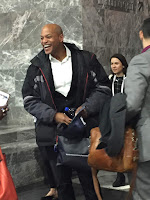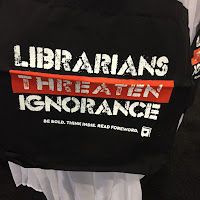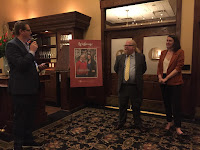Opening Keynote
ALA President Wanda Brown opened the conference. In her remarks, Brown noted that "we are the heartbeat of our communities." That is something that we - libraries and library staff - know, but is something that our communities rediscover on occasion and then think that this relationship between us and them is new.Wanda Brown introduced Wes Moore, who was our opening keynote. This was the second time that I've been able to hear Wes Moore speak and he was as engaging as he was at IFLA.
Moore began by talking about his early life and his connection to the public library. When he was in fifth grade, he read at a third grade level. His mother used Brown's love of sports to connect him with books, and his love of reading was born. (That first book was on the Michigan Fab Five.)
He then talked about writing The Other Wes Moore, which was a book about individual choice and societal dynamics. He then moved to talking about his upcoming book, Five Days: The Fiery Reckoning of an American City, which is about the protests and activities in Baltimore after the death of Freddie Gray in police custody. Moore calls this a story about poverty.
Freddie Gray had led a tragic life. He was born underweight to a mother who was an addict, and that means he was born an addict. He got lead poisoning from his environment before he was 2 years old. Freddie's life did not get better and it was not a peaceful one. Moore believes that the week Freddie Gray was in a coma may have been the most peaceful week of Gray's life. That is heartbreaking.
Moore asked if poverty was the cause of the problem's in Freddie Gray's life or the result. Then he wondered:
- How did we get here?
- What do we do next?
Those are questions, I believe, for which we are still seeking answers.
Important to Moore - and to the story - was the location and role of the Enoch Pratt Library. That library is in the area that was racked by protests, yet it was untouched. People in the local community viewed it as a meeting place and a place that tried to lift people up. Moore said that we (library workers) are where the people are, and that our role is to help those people realize that they are not alone.
Wes Moore left us wondering what we each can do in our own way to make the world a better place, and to heal the pain. As I look at our communities - no matter their economic status - this is a question we all should be wrestling with.
Important to Moore - and to the story - was the location and role of the Enoch Pratt Library. That library is in the area that was racked by protests, yet it was untouched. People in the local community viewed it as a meeting place and a place that tried to lift people up. Moore said that we (library workers) are where the people are, and that our role is to help those people realize that they are not alone.
Wes Moore left us wondering what we each can do in our own way to make the world a better place, and to heal the pain. As I look at our communities - no matter their economic status - this is a question we all should be wrestling with.
The Exhibit Hall
I know that an important funding stream for an association is its conference and that the vendors are critically important to that. So I do believe in going to the exhibit hall. I'm always pleased to see new products and will send relevant info to colleagues, when I can. And yes, the exhibits can just be fun!On Friday, one booth that stood out to me was the Islamic Circle of North America. They had copies of the Quran and other books available for free, and were more than willing to talk about Islamic culture. I'm heartened to see exhibitors like this, who are at the conference to extend the educational content into the vendor area.
Short Edition had short story dispensers around the conference site. These dispensers contained locally-curated content of one-minute, three-minute, and five-minute stories. A dispenser in the exhibit hall contained comics and stories specifically for young adults. I was fascinated and printed several stories over the four-day event. Yes, I am reading them.
Colleagues wondered if this functionality could be done using existing technology and whether children/young adults would print many stories - creating piles of papers - without reading them. I agree that both questions are good ones. Concerning too many people printing stories, I'll note that I saw very few people printing stories, which felt strange since most people at the conference would describe themselves as readers. I do think this functionality could be quite interesting in some environments. I hope I run across one again, so I can print/read more!
Library Journal Librarians of the Year
Friday evening, Christian Zabriskie and Lauren Comito - founders of Urban Librarians Unite - received the Library Journal Librarian(s) of the Year Award. The more I get to know Christian and Lauren, the more impressed I am with their work. If you are unfamiliar with them, please read the LJ article.Christian is now the executive director of the Onondaga County Public Library (system), where I am now the president of its Board of Trustees. I am thrilled that he is in Syracuse and that I'll be working with him in the weeks and months to come.





No comments:
Post a Comment